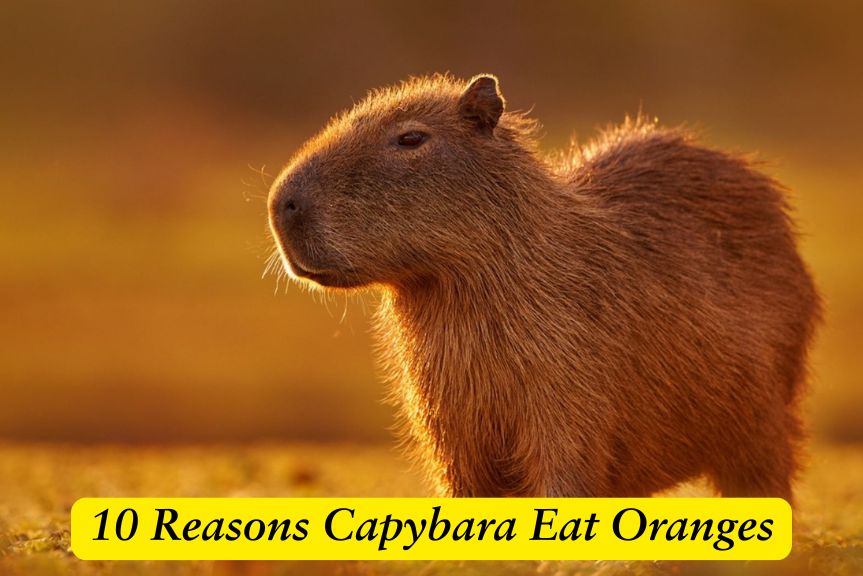Capybaras are fascinating creatures that captivate the hearts of both pet lovers and wildlife enthusiasts. These gentle giants often eat fruits, and oranges are among their favorites. Capybaras are known to love oranges. This article examines the reasons why these animals love them, examines their nutritional benefits, and explores whether it is safe for them to eat oranges.
What Do Capybaras Eat Naturally?
Capybaras are herbivores and feed primarily on grasses, aquatic plants, and fruits when available. They consume fiber-rich grasses, sedges, and water plants that provide them with the nutrients they need to survive and thrive. In addition to eating vegetables, capybaras also eat fruit, such as bananas, apples, and citrus fruits. Their tolerant diets allow them to survive in a range of environments, from swamps to forests.
Why Are Oranges So Appealing to Capybaras?
Fruits with bright colors and intense aromas are highly attractive to capybaras, including oranges, the most sweet and juicy of all fruits. The sweet and hydrating properties of oranges make them a tasty and hydrating treat for capybaras. As oranges contain a high moisture content, they may be especially appealing to capybaras living near water, as the fruit helps them hydrate more effectively than plain water.
10 Reasons Capybara Eat Oranges
1. Oranges Are Naturally Sweet
As with most animals, capybaras enjoy sweet foods. The natural sugars in oranges provide an instant energy boost, which is why capybaras love eating them. Any capybara will enjoy the bright flavor of an orange.

2. Oranges Provide Hydration
As oranges contain about 85% water, they provide good hydration for capybaras, who must maintain their hydration during the hotter months. While eating oranges, they get the moisture they need from their high water content.
3. Rich in Vitamin C
Vitamin C is a key nutrient in oranges. Like humans, capybaras depend on vitamin C for maintaining a healthy immune system. Vitamin C helps to fight infections and maintains the strength of their skin and connective tissues. An essential vitamin is found in oranges, which is consumed by capybaras.
4. Supports Digestive Health
Dietary fiber in oranges promotes smooth bowel movements and prevents constipation in capybaras, helping to maintain digestive health. Fiber balance is also important for a capybara’s overall health.
5. Oranges Are Low in Fat
As herbivores, capybaras prefer a low-fat diet. A healthy snack option, oranges are low in fat compared to other fruits that might contain unhealthy fats. Capybaras can enjoy something flavorful and fat-free by eating oranges.
6. Natural Antioxidants
As an excellent source of antioxidants, oranges prevent cell damage and support overall health by neutralizing harmful free radicals. The protective properties of oranges contribute to the longevity and vitality of capybaras.
7. Source of Potassium
As well as potassium, oranges are rich in vitamin C, which improves blood flow and regulates blood pressure. Due to their frequent contact with water, capybaras need potassium to stay hydrated. Potassium in oranges keeps their bodies functioning properly.
8. Oranges Are Fun to Eat
Apart from their nutritional benefits, oranges are simply fun to eat for capybaras. Their juicy texture provides a satisfying sensory experience. Capybaras are social and curious animals, so they are attracted to food in various ways. It is engaging and enjoyable to peel and bite into an orange.
9. Helps with Weight Management
Oranges can make a great addition to a capybara’s diet without contributing to weight gain due to their low calorie content. They are also healthier than other sugary snacks. Additionally, fiber keeps capybaras full longer, promoting healthy weight management.
10. Oranges Offer Variety in Their Diet
Although capybaras are primarily herbivores, they also eat grasses, vegetables, and fruits. Oranges add diversity to their diet by introducing a different texture, flavor, and nutrient profile. It is important for capybaras to eat a variety of foods in order to ensure they get the nutrients they need.
Should Capybaras Eat Oranges?
With their high water content and vitamin C content, oranges are a great treat for capybaras when fed in moderation. To avoid health problems such as obesity and digestion issues, it is important not to overfeed oranges.
